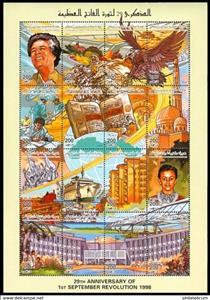Mini Sheet: September Revolution (Libya 1998)
September Revolution (Libya 1998)
01 September (Libya ) within release The 29th Anniversary of September Revolution goes into circulation Mini Sheet September Revolution face value 16*200 Libyan dirham
| Mini Sheet September Revolution in catalogues | |
|---|---|
| Michel: | Mi: LY 2609-2624KB |
Mini Sheet is square format.
Also in the issue The 29th Anniversary of September Revolution:
- Stamp - September Revolution face value 200;
- Stamp - September Revolution face value 200;
- Stamp - September Revolution face value 200;
- Stamp - September Revolution face value 200;
- Stamp - September Revolution face value 200;
- Stamp - September Revolution face value 200;
- Stamp - September Revolution face value 200;
- Stamp - September Revolution face value 200;
- Stamp - September Revolution face value 200;
- Stamp - September Revolution face value 200;
- Stamp - September Revolution face value 200;
- Stamp - September Revolution face value 200;
- Souvenir Sheet - September Revolution face value 200;
- Stamp - September Revolution face value 200;
- Mini Sheet - September Revolution face value 16*200;
- Stamp - September Revolution face value 200;
- Stamp - September Revolution face value 200;
- Stamp - September Revolution face value 200;
- Stamp - September Revolution face value 200;
Mini Sheet September Revolution it reflects the thematic directions:
An anniversary is the date on which an event took place or an institution was founded in a previous year, and may also refer to the commemoration or celebration of that event. For example, the first event is the initial occurrence or, if planned, the inaugural of the event. One year later would be the first anniversary of that event. The word was first used for Catholic feasts to commemorate saints. Most countries celebrate national anniversaries, typically called national days. These could be the date of independence of the nation or the adoption of a new constitution or form of government. The important dates in a sitting monarch's reign may also be commemorated, an event often referred to as a "Jubilee".
A book is a medium for recording information in the form of writing or images. Books are typically composed of many pages, bound together and protected by a cover. Modern bound books were preceded by many other written mediums, such as the codex and the scroll. The book publishing process is the series of steps involved in their creation and dissemination.
A building or edifice is a structure with a roof and walls standing more or less permanently in one place, such as a house or factory. Buildings come in a variety of sizes, shapes and functions, and have been adapted throughout history for a wide number of factors, from building materials available, to weather conditions, to land prices, ground conditions, specific uses and aesthetic reasons. Buildings serve several needs of society – primarily as shelter from weather, security, living space, privacy, to store belongings, and to comfortably live and work. A building as a shelter represents a physical division of the human habitat (a place of comfort and safety) and the outside (a place that at times may be harsh and harmful).
A dictator is a political leader who possesses absolute power. A dictatorship is a state ruled by one dictator or by a polity. The word originated as the title of a Roman dictator elected by the Roman Senate to rule the republic in times of emergency. Like the terms "tyrant" and "autocrat", dictator came to be used almost exclusively as a non-titular term for oppressive rule. In modern usage, the term dictator is generally used to describe a leader who holds or abuses an extraordinary amount of personal power.
A people is a plurality of persons considered as a whole, as is the case with an ethnic group or nation. Collectively, for example, the contemporary Frisians and Danes are two related Germanic peoples, while various Middle Eastern ethnic groups are often linguistically categorized as Semitic peoples.




